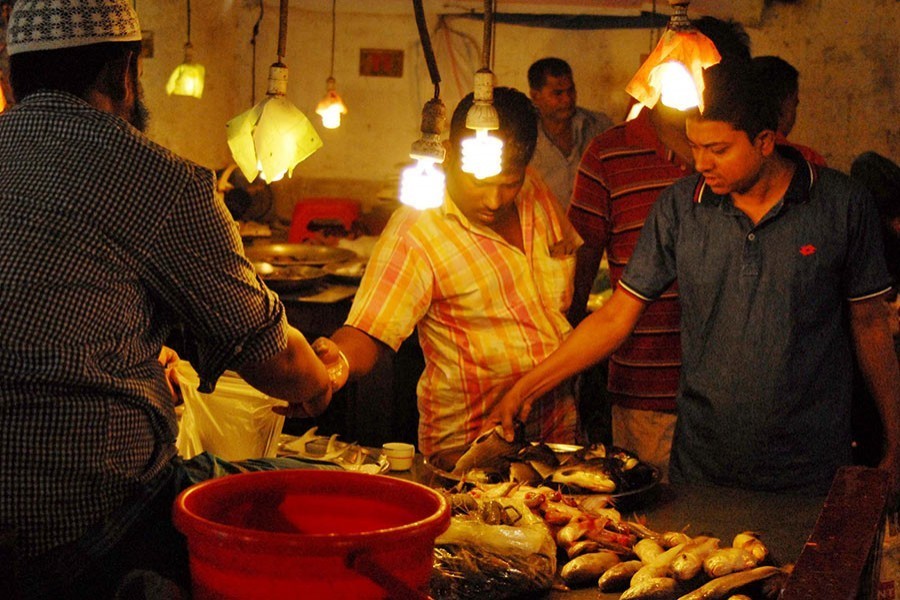
Published :
Updated :

One of the reasons that prompted the masses to put their weight behind the students' movement against discrimination in July and August this year was the high prices of most essentials. They vented their pent-up anger against the soaring prices of most food items by joining the movement that they felt was their last opportunity to topple a tyrant of the worst type.
The people who embraced martyrdom and were injured in the fight against the oppressive law-enforcing agencies and marauding Bangladesh Chhatra League and Jubo League armed cadres belong to the working class. Their number is far more than students.
This particular class of people and the middle class, who also lent full support to the students' movement, are now utterly frustrated because the prices of most food items have surpassed records. Vegetables, fish, eggs, rice, etc., are now costlier than ever. The cheapest vegetable now costs at least Tk 80 a kg. For no reason, rice prices have increased by Tk. 6 to Tk.8 a kg at the retail level. Floods and excessive rains for days together obviously have caused damage to standing crops, including vegetables, leading to a rise in prices of some perishable commodities. However, the price increase level is beyond any logic. Thus, being hit below the belt, consumers are profoundly dissatisfied and question the quality of market management by the interim government.
Why are the prices of most essentials high beyond any justified reason in Bangladesh? This is, in fact, a million-dollar question. Unfortunately, no government has ever tried to investigate the problem and find a suitable answer.
Factors such as demand and supply, the presence of so-called item-based market syndicates, illegal toll collection at various points, transportation costs, the highhandedness of middlemen, the lack of an efficient market mechanism, and credible statistics on the production of farm goods, poultry items, and fish have never been taken into consideration together in any broad-based market research by the relevant authorities.
People are found alleging the lack of 'market monitoring' when prices of certain essentials go up. How effective will market monitoring be when many issues distort the price mechanism? That is why drives conducted by the consumers' rights protection directorate do not produce any results. Abnormal price hikes of commodities are diseases, and they have many symptoms that need to be addressed with the right kind of medicines.
Since his takeover of the central bank, the incumbent governor has been trying hard to tame price inflation with all the available options. But food inflation continues to be stubbornly high. Lately, the government has taken a few fiscal measures to help reduce the prices of some selected kitchen items. That is unlikely to have any major impact on food inflation.
The prices of most food items remained unusually high during the last couple of years of the deposed Sheikh Hasina Government. When Prof. Dr Yunus took over as head of the interim government following the student-people mass upsurge in August last year, the poor consumers expected a respite. But their hope was dashed, mainly due to consecutive floods and heavy downpours across the country.
The allegation that business syndicates are very much active, at least in marketing a few items, has again proved to be true. The decline in prices of eggs following the government announcement to allow import of the item is a case in point. How come the cost of a dozen eggs declines by Tk 20 in a day? It must be the handiwork of the big players (corporate suppliers) in egg trade. The relevant authorities must not stop importing a few million eggs to cool off the market. They must go beyond that, find the big fish and take them to task.
During the late monsoon, vegetable prices rise in most years, but they start declining with the arrival of fresh winter vegetables. At the peak of winter, vegetable supply becomes abundant, and prices come down to a reasonable level. This year was an exception because of a natural calamity.
The government's most important work is getting quality data on acreage and production of primary farm produce. There is every reason to doubt the quality of statistics made available by the Department of Agricultural Extension and the Bangladesh Bureau of Statistics. For instance, the available data shows that the country produces more onion than it needs. Still, if India restricts the export of the tuber, the onion prices shot up almost instantly. Why?
The same is true for some other items, including rice. During the immediate past government, Sheikh Hasina and her cohorts relentlessly claimed that the country was self-sufficient in food production when the facts remained otherwise. The country has been importing rice and wheat without any pause recently.
The fact that intermediaries have a role in pushing up prices of farm items is evident from a report published in The Financial Express on Friday. The report showed that the price difference between the growers' level and the consumers' end was almost 100 per cent. Middlemen of all sorts, including toll collectors, are still active. And there is no reason to think that they will vanish during the rule of this or any future government. During the 14-year rule of Hasina, the number of these people had been on the rise. And they wielded enormous power with state patronization. If anyonedared make a move against them, one would deserve kudos!


 For all latest news, follow The Financial Express Google News channel.
For all latest news, follow The Financial Express Google News channel.